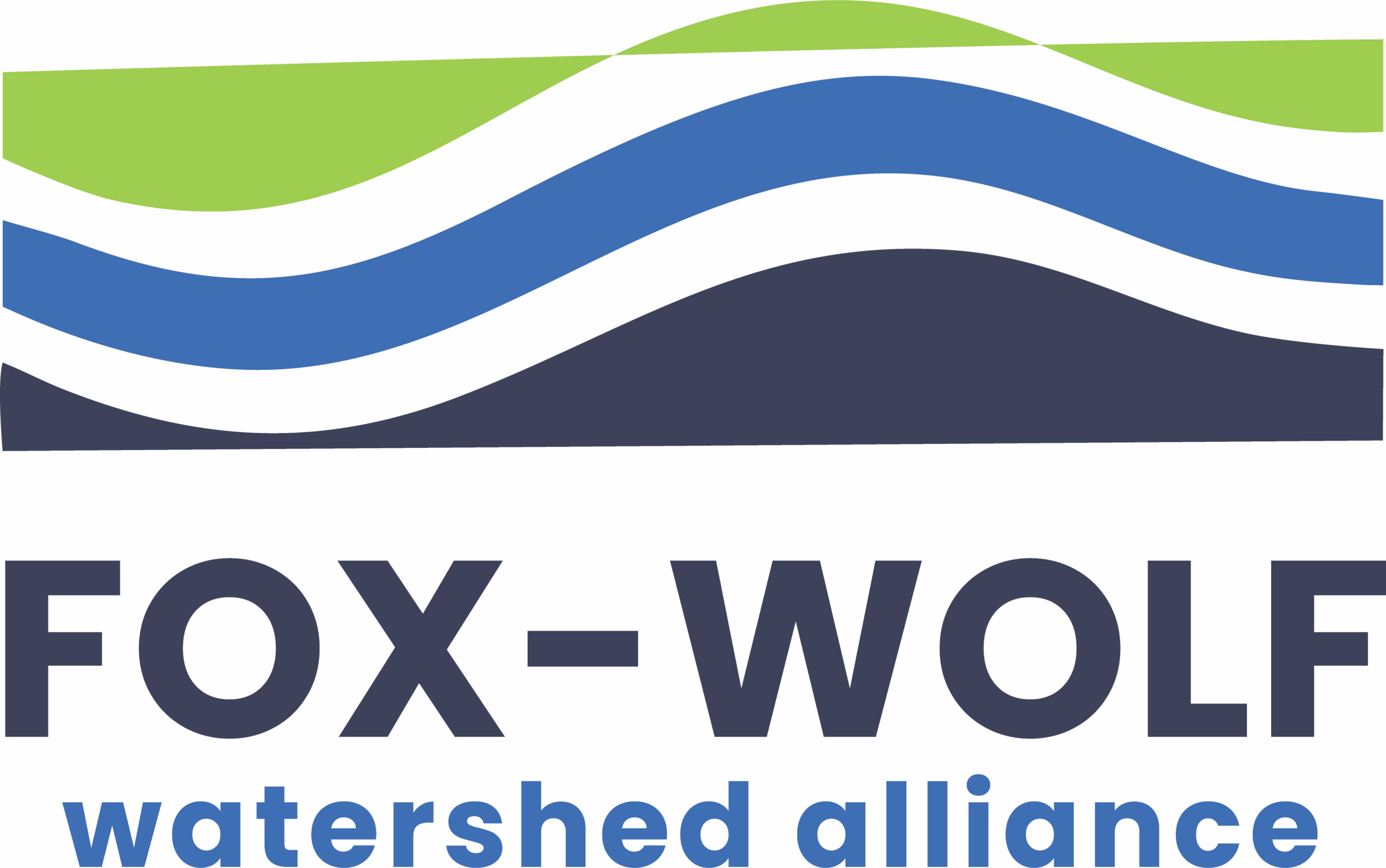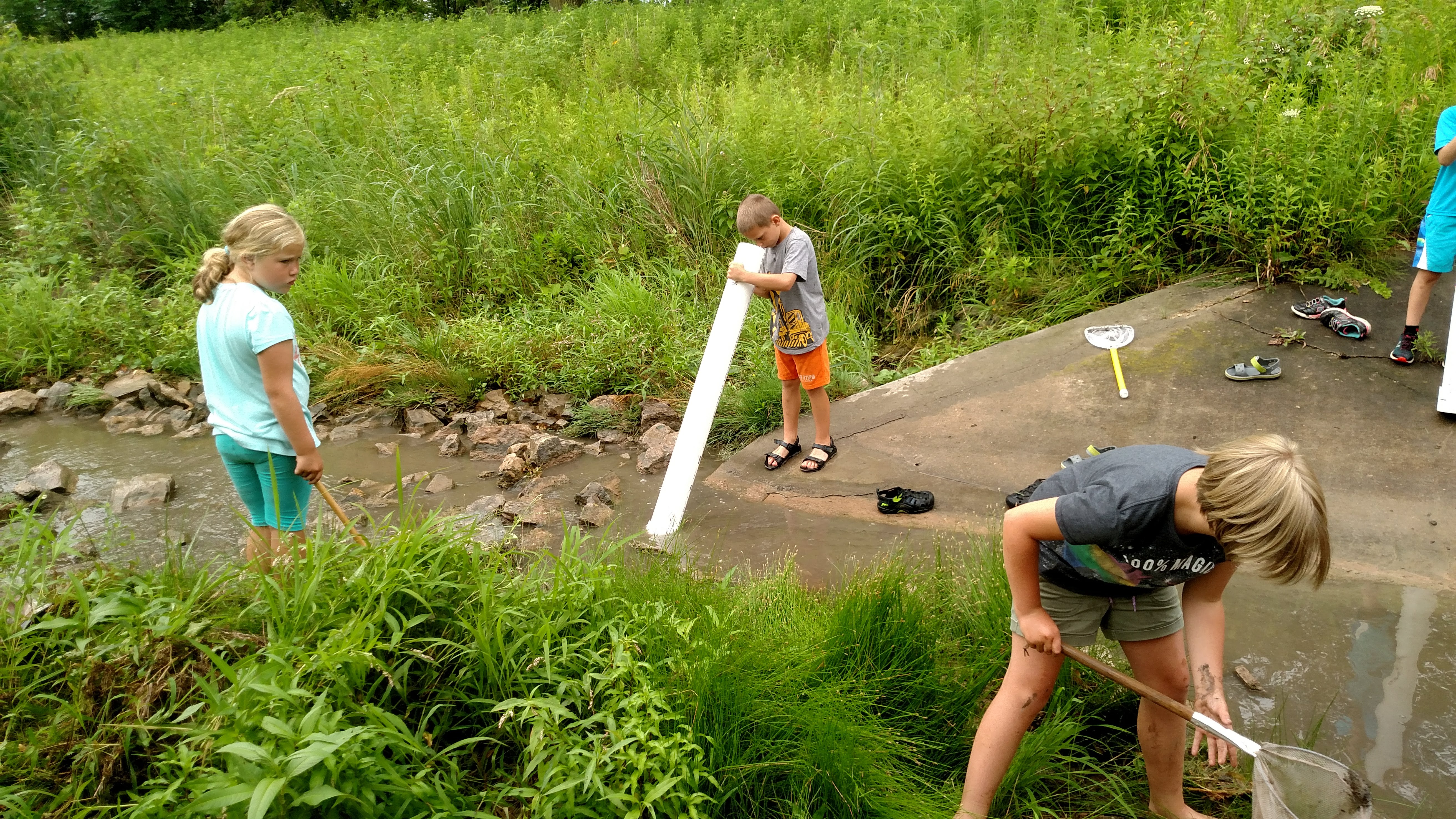FWWA has contracted with the City of Appleton for the past eight years and has provided watershed-based lessons for campers attending Camp APRD. Campers can register for one week of camp, or the entire summer, with a maximum of 30 campers each week. Many kids return to Camp APRD year after year, and it’s nice seeing familiar faces. While we taught some similar lessons as in previous years, we had all new activities this year, and the kids had a lot of fun and learned a ton. Below is a recap of our adventures:
Week One: All about Stormwater
The campers learned about stormwater runoff through pictures. We discussed the connection between our land and our waters, and what role we all play in keeping our waters clean. The kids played the stormwater runoff plinko game, twice, which taught them about green infrastructure practices and the places that help runoff soak into the ground instead of entering our waters. Afterward, and then worked in groups to find the ten pollutants hidden in the stormwater “Find it” jars.
Week Two: Focusing on Floodplains
 During week two of summer camp, campers learned about floodplains. We talked about permeable and impermeable surfaces, and how they impact water levels and pollution in our watershed. As groups, we utilized the floodplain model to see how runoff compared between a parking lot, stormwater pond, and a wetland. The Ward’s Floodplain model is a new addition to our outreach tools provide to us as a generous donation from the City of Appleton. After learning about floodplains, the campers did a cleanup of the park. We’re happy to report that we did not find a lot of garbage!
During week two of summer camp, campers learned about floodplains. We talked about permeable and impermeable surfaces, and how they impact water levels and pollution in our watershed. As groups, we utilized the floodplain model to see how runoff compared between a parking lot, stormwater pond, and a wetland. The Ward’s Floodplain model is a new addition to our outreach tools provide to us as a generous donation from the City of Appleton. After learning about floodplains, the campers did a cleanup of the park. We’re happy to report that we did not find a lot of garbage!
Week Three: Pick up the Poop!
Campers reviewed what we talked about in week one of camp. We continued to talk about stormwater runoff, and we saw it in action using the Enviroscape model. We talked about the importance of picking up pet waste, and the impact of bacterial runoff in our waters. We then played several rounds of dog poop relay races. The kids had a lot of fun picking up the fake poop. Afterwards, the campers searched for hidden poops on the back of their “Good Dog, Good Owner” Renew Our Waters flyers.



Week Four: Designing Rain Barrels
This week, we talked about rain barrels. We talked about how rain barrels are used and how that relates to our discussions about stormwater runoff. Afterwards, the campers were split into three groups that worked together to come up with creative designs for the rain barrels using colorful duct tape. The campers did a great job with this. We also made this activity a competition by posting the photos on our Facebook page, and asking visitors to vote for their favorite design. The team with the most votes received a prize the following week.





Week Five: Sampling a Stream
This week we talked about stream health. We discussed the presence of macroinvertebrates in the water and how their tolerance to pollution varies among species. The kids were all provided with their own copy of the Key to Macroinvertebrate Life in the River (poster), and we discussed as a group how to use this taxonomic  key. Afterwards, the students were asked to look for particular species including caddisfly larva, damselfly nymphs, dragonfly nymphs, and others included on the Citizen Monitoring form, were given nets and buckets, and headed down to the park’s stream. They found many critters including slugs, leaches, and worms. Afterwards, the campers headed back to the shelter to play many rounds of stream bingo–with fun prizes of course! After calculating our score from the species we found, we determined that stream had “poor” conditions.
key. Afterwards, the students were asked to look for particular species including caddisfly larva, damselfly nymphs, dragonfly nymphs, and others included on the Citizen Monitoring form, were given nets and buckets, and headed down to the park’s stream. They found many critters including slugs, leaches, and worms. Afterwards, the campers headed back to the shelter to play many rounds of stream bingo–with fun prizes of course! After calculating our score from the species we found, we determined that stream had “poor” conditions.
Week Six: Creepy Crawlers
This week, the campers learned about the characteristics that define insects and separates them from other bugs like spiders, ticks, and worms. We gathered up our supplies and searched for insects in the park. We also talked about the different types of environments in the park, and what kinds of insects live in the different habitats. Afterwards, the kids worked in groups to build and label their Lego insects.



Week Seven: All About Algae
This week was so much fun! This was our first time teaching campers all about algae! We talked about algae, the good and the bad, the different types, and what human activities impact algae growth. The campers examined the algae from the park’s pond and determined it was a type of filamentous green algae. Afterwards, we made “algae” slime that the kids took home with them.


Week Eight: Waterfowl
For our final week at summer camp we talked about waterfowl. The campers learned interesting facts about waterfowl that are commonly found in this area. They learned about their diets, habitats, and some history related to conservation efforts for protecting waterfowl. The campers worked in groups to complete a waterfowl matching game that had the kids using field guides to find the correct answers for facts about diving ducks, dabbling ducks, and geese. Afterwards, we painted bird houses! We had a great summer working with these awesome kids!

We look forward teaching summer campers in 2020!
For more information contact, kelly@fwwa.org.

